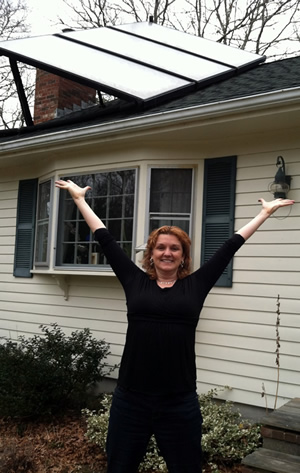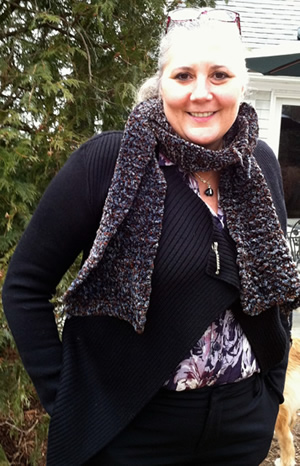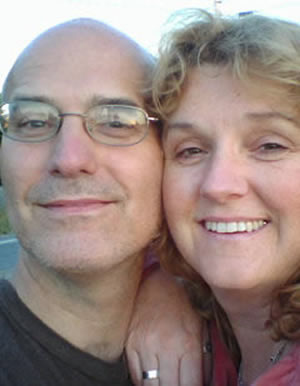The Ease of Living with Solar
by Jane Dressel Schaller

Sustainable energy is Occupying Cape Cod. Our prominent peninsula not only stands out geographically, but also leads the way environmentally. While many talk the solar power talk, others walk their own solar power walk.
Owner/Teacher of Kind Yoga School and mastermind of the current Yoga Everywhere project, Diane Kovanda and husband, Jack Adams, chose to install a solar hot water system in their modest Centerville home eight years ago.
Apart from the discernible environmental benefits, what drew Diane in? Drawing many hot baths, of course. "You never run out of hot water!" she lauds with a glint in her eye. Diane relishes her ability to luxuriate in perpetually available hot water after Jack has taken equally long hot showers only moments prior.
Diane and Jack's water tank is still powered with gas but money is saved because far less gas needs to be used in order to fully heat the tank. The water is preheated through the glycol inside of the solar panels to a range of 98 to 109 degrees before the water is transferred to the gas-fueled hot water tank.
Gas-powered tanks, in homes without a solar-powered hot water system, need to begin the water-heating process when the water is still cold.
Luxuriating in plentiful hot water has not been the only plus for Diane and Jack. In the years since the installation of their system, nothing has broken down or necessitated a service call.
The couple yearned to directly impact the environment by means of their lifestyle. "Our goal was that we wanted to have the smallest footprint of usage," Diane explains. "Even though we are not saving tons of money, we are still saving the usage of gas and taking advantage of the free sunshine every day."
Diane stresses the importance of focusing on "un-sexy" ways to help the environment. Every person doing little things – such as hanging clothes on the line instead of running the dryer or turning out lights upon leaving rooms – could add up to accomplishing just as much or more than depending on the government or huge electric companies to make costly and politically-motivated changes on our behalf.
 |
Eight years ago Patricia Fater, a family practitioner and owner of Complete Wellness in Cotuit, and her family chose to do their part by having both a system that produces electricity and a solar hot water system.
Having their own solar system "seemed like a practical thing to do as well as a good thing to do and feasible due to rebates," Dr. Fater reflects. "It was a benefit right from the beginning." While neighbors were met with rising electrical bills, theirs remained stable.
Like Jack and Diane, the Faters have had minimal reasons to call for repairs. "We had to get one fuse in the switchbox in the basement replaced but that has been it, in terms of maintenance," Patty asserts. In addition, the panels do not "cause any wear and tear on the roof."
The Faters' home derives its power from sensors that convert heat into electricity. Once their solar system was in place, Patty has kept a monthly log of the number of Kilowatts (Kw) produced by the panels – from a low of 50 Kw in the winter to 300 Kw in the summer.

"We are required to report our monthly production online to Mass CEC (Massachusetts Clean Energy Center)," says Patty. "It helps the state report on private alternative energy production, and about twice a year I get a check for some small amount of money.
Newer systems are getting an even better payback, called SRECs or Sustainable Renewable Energy Credits."
"It is really amazing how efficient it is," according to Patty. The Faters' central AC accounts for much of the summer use – not to mention the energy it takes to be house parents to Cotuit Kettleer ball players each season.
In the eight years since these two families began to solar power-walk, numerous others have chosen to follow suit. The initial cost of such a system can be overwhelming, which is why the lure of rebates was a primary selling point for the Faters.
The solar energy business has evolved to provide programs that offset such costs, including zero-percent loans with no initial outlay, attracting future consumers.
Solar energy "pays for itself in the satisfaction of knowing I am not using up as much resources on the planet," mulls Diane. "I am taking advantage of the free resource of sun every day!"
Jane Schaller is our 'web princess' and a contributing writer for this magazine. She has an AS in Web Design and Development from Cape Cod Community College.
She is a freelance web designer and writer. Mother to three grown daughters, she resides in the Web Princess palace with her dog, Wilbur, cat, Jack and husband, Bill.

Jack Adams, PhD (Electrical and Computer Engineering) answers a few questions
about living with solar
What was your motivation for getting the solar panel eight years ago?
I'm an electrical engineer, and teach at Merrimack College in Andover. I've had a strong interest in renewable energy for years now. My primary motivation is to have a positive impact on the environment through use of appropriate technology.
I'm also interested in approaches that not only impact the environment but do so while saving money. There are two main types of solar panels - ones that produce electricity and ones producing hot water.
Due to much lower costs, and shading issues, we chose a solar hot water system for our home. Our system went on line in December of 2007. After all rebates, we had a fully functioning system, with a gorgeous, lifetime warranted stainless steel water tank, for about $4,400.
How did the "fantasy" of having solar compare with reality?
I was immediately impressed that, even in January, we saw significant heat in our hot water tank. The roof collector read 170 degrees when it was 20 degrees and sunny on January 2! Basically, the solar panel acts like a very effective, miniature greenhouse, and the greenhouse heat is transferred to the hot water. Because we're a family of two, and already fairly frugal, we didn't see huge savings - our payback time might be 10 years. We didn't save as much as we anticipated, although we're saving and have no regrets about having purchased the system.
Compare your professional views with personal ones about the reality of solar.
As an electrical engineer, I find the continual improvements and ongoing price reductions associated with solar technology very exciting. Solar engineers and manufacturers intend that solar power compete directly with "fossil" fuels such as coal, oil, and natural gas.
Solar is already quite reliable, and as prices fall the total number of installations will increase quite a bit across the U.S. On the whole, solar cannot provide all of our power, and other issues, such as being much more efficient, are crucial. Personally, my view is that solar is already competitive if we consider the negative environmental impacts of burning coal and place a value on avoiding pollution.
Would you recommend it to others?
The incentives for solar hot water are still great, at least in Massachusetts, so solar hot water is a great option for someone with a roof facing within 30 degrees of due south, and that doesn't have much shading. A family of four would see a much quicker payback than we will - perhaps 5-7 years.
If you have an unshaded roof, or nearly so, which faces close to due south, then solar electric can be a great option. Someone with a typical system might realize $3,000 per year in savings and rebates.
Because of the positive impact on the environment, and the cash savings, I strongly recommend solar electric. There are many installers, and I'd get quotes from at least two before deciding. They will gladly come, check out your building, and provide a quote if in fact solar is an option for you. A good installer will help you with a whole home plan, including taking energy efficiency actions.
